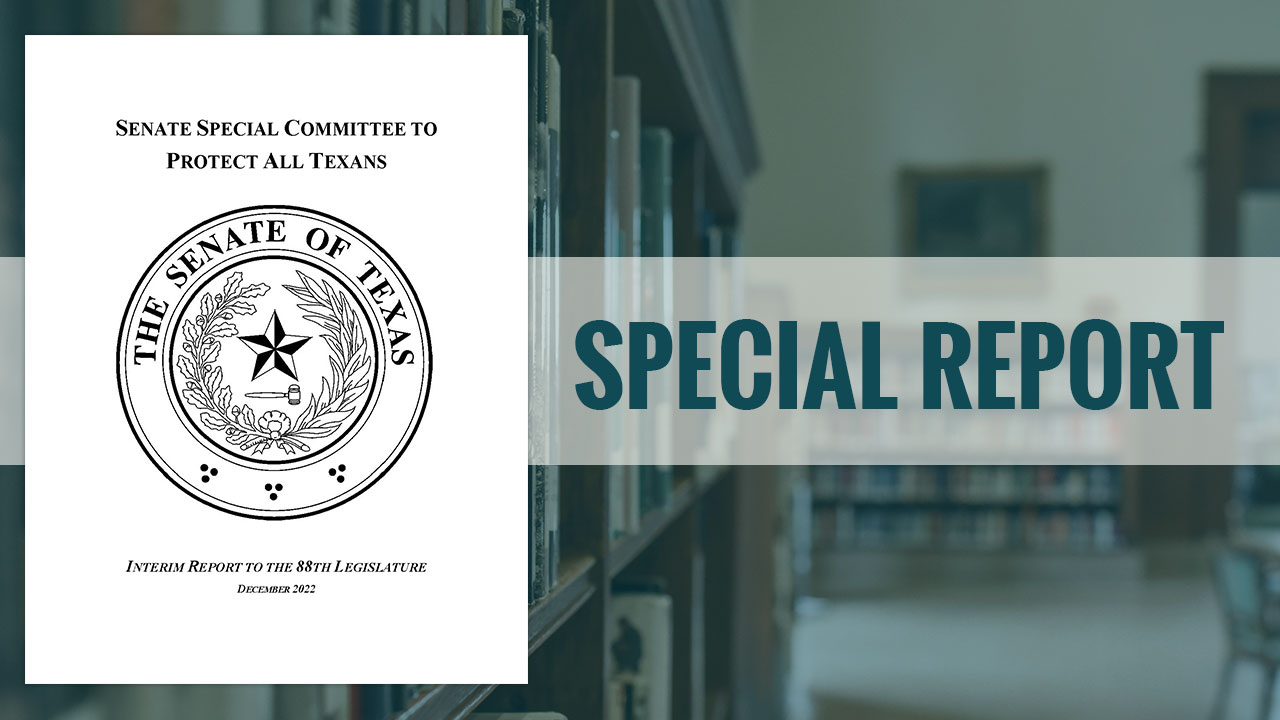Texas Senate Special Committee to Protect All Texans Makes In-Building Communications Recommendations

Cites Cellular and LMR Coverage Problems during Uvalde Tragedy
Posted on March 1, 2023
A recent report,Texas Senate Special Committee To Protect All Texans, found that communications issues at the Uvalde School contributed to the challenges law enforcement faced during the mass casualty incident.
These issues were addressed in previous SBC Newsletter articles published in 2022 (see info box at the end of this article). But the report from Texas is additionally significant, because it reveals that Texas State Senators are now aware of the problem of in-building wireless dead zones, and are calling for corrective action and funding to address the problems found in the report.
Among the Senators identified by quotation in the report are Senators Nichols, McCraw, Zaffirini, Creighton, Perry, Gutierrez, and Standridge.
Here are relevant excerpts from the report:
- Senator Nichols asked for information about radio communications inside the school building. McCraw said a test of the radios of all agencies on the scene showed the Border Patrol radios were the only ones that functioned properly.
- In response to a request from Senator Zaffirini, McCraw listed findings of the assessment, including inadequate and vulnerable fencing, lack of controlled access points, lack of reinforced windows, vulnerable doors, lack of lock boxes for master keys, lack of duress systems, inaccurate building diagrams, and a need for improved radio and cell phone communications.
- Senator Zaffirini and McCraw discussed options to replace or improve radio and cell communications in schools throughout Texas.
- Senator Creighton and McCraw discussed the breakdown in radio and cell phone communications.
- Senator Perry asked for information regarding an interoperability channel to improve communications. McCraw said that Arredondo did not initially have a radio with him and that the radios issued to UPD, DPS, and the sheriff's department did not work inside the building. He said that DPS radios did not work until they were 10 feet away from the building, which was a technology issue rather than an interoperability issue. Senator Perry and McCraw discussed interoperability of radio communications between law enforcement agencies.
- Senator Gutierrez asked whether it is correct that UPD can communicate with up to 17 first responders. McCraw replied in the affirmative. Senator Gutierrez said that audio records and statements indicate that Arredondo was the incident commander but that he clearly has said otherwise. McCraw concurred. Senator Gutierrez said that it is important to note that the dialogue on the timeline is from body camera footage. He said that radio communications did not function inside the school and that Arredondo could not indicate to those out of view that he was in command because radio communication was not possible.
- Senator Zaffirini asked if teams are trained to resolve radio and telephone communication issues. Curnutt replied in the affirmative. He explained that they work to master the basics first. Senator Zaffirini and Curnutt discussed cell phone communications in border areas.
- Senator Zaffirini, Perdue, and Standridge talked about the need for improved radio communications systems and gear, like ballistic helmets and breaching tools. Perdue said that all departments have P25-compliant interoperable radios, but that active response situations can create confusion. He said that UV-resistant windows in new construction areas impede radio signals and that distributed antenna systems are necessary to boost radio signals in buildings. He said there is a state operability commission that governs interoperability. Standridge said that San Marcos police officers have no helmets, 12 shields, and 10 breaching tools for the entire division. However, he said that the failures at Uvalde were the result of a deficiency in commitment rather than a deficiency in equipment.
- Hawthorne said multijurisdictional responses are unorganized and that radio communications must be improved. He said all types of departments must network and train together to improve responses to active situations. He said while most departments all know each other, they rarely train together. He said from their perspective, you cannot harden your schools enough. He said that contracting with sheriffs' departments to hire SROs is a cost-efficient and effective way to harden schools. Contracting means schools do not have to develop and maintain a police department infrastructure, including the software, training, and vehicles.
- Avera said that some ISDs in rural areas do not have access to P25-compatible radios and that funding is needed to provide new equipment.
If you are based in Texas, and would like to reach out to your Senators’ staff to find out more about the report, or to offer subject matter support, following is a list of Senators on the committee.
The Senate Committee Members were:
- Senator Robert Nichols, Chair
- Senator Lois Kolkhorst, Vice-Chair
- Senator Brandon Creighton, Vice-Chair
- Senator Judith Zaffirini
- Senator Royce West
- Senator Juan "Chuy" Hinojosa
- Senator Brian Birdwell
- Senator Donna Campbell
- Senator Charles Perry
- Senator Paul Bettencourt
- Senator Bryan Hughes

Web Link to Report: https://senate.texas.gov/cmtes/87/c639/c639_InterimReport_2022.pdf
Have a comment about this article? Send us your feedback or question...
Related Content:
|



